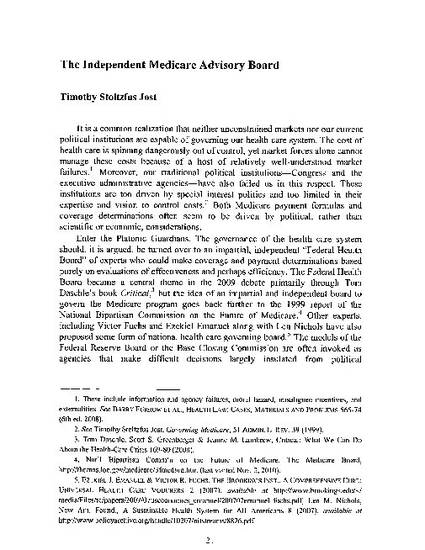
Article
The Independent Medicare Advisory Board
Yale Journal of Health Policy, Law, and Ethics
Disciplines
Abstract
It is a common realization that neither unconstrained markets nor our current political institutions are capable of governing our health care system. The cost of health care is spinning dangerously out of control, yet market forces alone cannot manage these costs because of a host of relatively well-understood market failures. Moreover, our traditional political institutions - Congress and the executive administrative agencies - have also failed us in this respect. These institutions are too driven by special interest politics and too limited in their expertise and vision to control costs. Both Medicare payment formulas and coverage determinations often seem to be driven by political, rather than scientific or economic, considerations.
Enter the Platonic Guardians. The governance of the health care system should, it is argued, be turned over to an impartial, independent "Federal Health Board" of experts who could make coverage and payment determinations based purely on evaluations of effectiveness and perhaps efficiency. The Federal Health Board became a central theme in the 2009 debate primarily through Tom Daschle's book Critical, but the idea of an impartial and independent board to govern the Medicare program goes back further to the 1999 report of the National Bipartisan Commission on the Future of Medicare. Other experts, including Victor Fuchs and Ezekiel Emanuel along with Len Nichols have also proposed some form of national health care governing board. The models of the Federal Reserve Board or the Base Closing Commission are often invoked as agencies that make difficult decisions largely insulated from political considerations and special interest pressure. The Federal Health Board would be composed of experts in health policy, health economics, and health care delivery who would be appointed for long terms of office through an apolitical process, such as appointment by the Comptroller General. Its members would be subject to rigorous conflict of interest strictures and would make decisions based on the evidence rather than on politics.
Citation Information
Timothy Stoltzfus Jost. "The Independent Medicare Advisory Board" Available at: http://works.bepress.com/timothy_jost/83/
